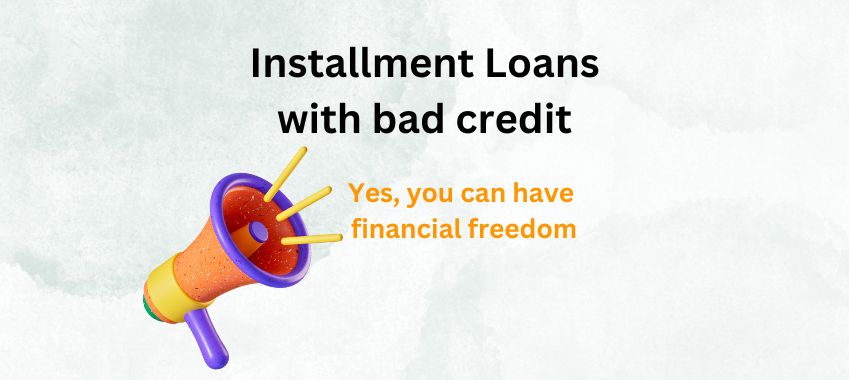In today’s financial landscape, having bad credit doesn’t necessarily mean you’re locked out of borrowing opportunities. Bad credit installment loans offered by some online lenders provide a lifeline for individuals seeking financial assistance despite their credit history. Unfortunately, many people think that having bad credit means they cannot get a loan. However, this is not entirely true. Installment loans are just one of the options available to people with bad credit who need to get money quickly.
We will delve into the workings of installment loans with bad credit, outline the typical requirements, and walk you through the online loan process.
Understanding Bad Credit Installment Loans
What are Bad Credit Installment Loans?
Bad credit installment loans are a type of loan specifically designed for individuals with poor or low credit scores. These loans provide an opportunity for people with less-than-ideal credit histories to borrow money and repay it over a fixed period through regular installments. Unlike traditional loans that heavily rely on credit scores and credit history, bad credit installment loans focus on other factors such as income, employment stability, and debt-to-income ratio.
How Do Bad Credit Installment Loans Differ from Traditional Loans?
Bad credit installment loans differ from traditional loans in several key ways. These differences primarily stem from the fact that bad credit installment loans are tailored to meet the needs of individuals with less-than-perfect credit histories.
Here’s a breakdown of how bad credit installment loans differ from traditional loans:
- Credit Requirements: Traditional loans typically have strict credit score requirements, and lenders heavily rely on credit history to assess the borrower’s creditworthiness. In contrast, bad credit installment loans are designed for individuals with poor credit, and lenders take into account other factors such as income, employment stability, and debt-to-income ratio when evaluating loan applications.
- Accessible to Bad Credit Borrowers: Traditional loans may be difficult to obtain for individuals with bad credit, as banks and traditional lenders often prioritize borrowers with excellent or good credit. Bad credit installment loans, on the other hand, cater specifically to individuals with low credit scores, providing them with an accessible borrowing option.
- Higher Interest Rates: Due to the increased risk associated with lending to borrowers with bad credit, bad credit installment loans tend to have higher interest rates compared to traditional loans. Lenders mitigate the risk by charging higher interest rates to compensate for the potential default or non-payment. However, with diligent research and comparison, borrowers can still find competitive rates among different lenders.
- Loan Amounts: Traditional loans, especially larger ones such as mortgages or business loans, may offer higher loan amounts compared to bad credit installment loans. Online bad credit installment loan providers typically smaller loan amounts, depending on the lender requirements, borrower’s income, and other factors. These loans are designed to address immediate financial needs and help borrowers rebuild their credit over time.
Benefits of Bad Credit Installment Loans
The major benefits of bad credit installment loans
- Access to Funding: The primary advantage of bad credit installment loans is that they provide access to funding for individuals who may otherwise struggle to secure a loan due to their credit history. These loans offer an opportunity to obtain the funds needed to cover various expenses, such as emergency bills, debt consolidation, or unexpected financial obligations.
- Credit Improvement Potential: Bad credit installment loans can contribute to improving credit scores over time. By consistently making timely payments and meeting the obligations of the loan, borrowers demonstrate responsible financial behavior. This positive repayment history can gradually help rebuild credit and potentially increase credit scores, opening up better borrowing options in the future.
Requirements for Bad Credit Installment Loans
Credit Score Considerations
Credit score considerations play a significant role in the approval process and terms of bad credit installment loans. While bad credit installment loans are designed for individuals with poor credit, lenders still evaluate credit scores to assess the borrower’s creditworthiness and determine loan terms.
Minimum Credit Score Requirements:
Lenders may have minimum credit score requirements that borrowers must meet to qualify for a bad credit installment loan. These requirements vary among lenders, so it’s important to research and find lenders who are willing to work with borrowers in your credit score range.
Income and Employment Requirements
Income and employment requirements are vital considerations for lenders when evaluating applications for bad credit installment loans. These requirements help lenders assess the borrower’s ability to repay the loan and gauge their financial stability. While specific income and employment criteria may vary among lenders, here are common factors to consider:
Minimum Income Threshold
Lenders typically have a minimum income requirement to ensure that borrowers have a steady source of income to cover their loan payments. This requirement helps determine if the borrower has sufficient funds to meet their financial obligations. The minimum income threshold varies among lenders and may depend on factors such as the loan amount and repayment period.
Employment Stability
Lenders often prefer borrowers who have a stable employment history. They may consider factors such as the length of employment with the current employer, job security, and the consistency of income. Demonstrating a stable employment history can instill confidence in lenders regarding the borrower’s ability to maintain regular income and meet loan repayment obligations.
Self-Employment and Alternative Income
If you are self-employed or have alternative sources of income, such as freelancing, rental income, or government benefits, you can still be eligible for a bad credit installment loan. Lenders may request additional documentation to verify your income and assess its stability.
Debt-to-Income Ratio
Lenders also consider your debt-to-income ratio (DTI), which compares your monthly debt obligations to your monthly income. A lower DTI indicates a healthier financial position and increases your chances of loan approval. Lenders may have specific DTI requirements or guidelines that borrowers must meet. It’s important to remember that income and employment requirements can vary among lenders.

